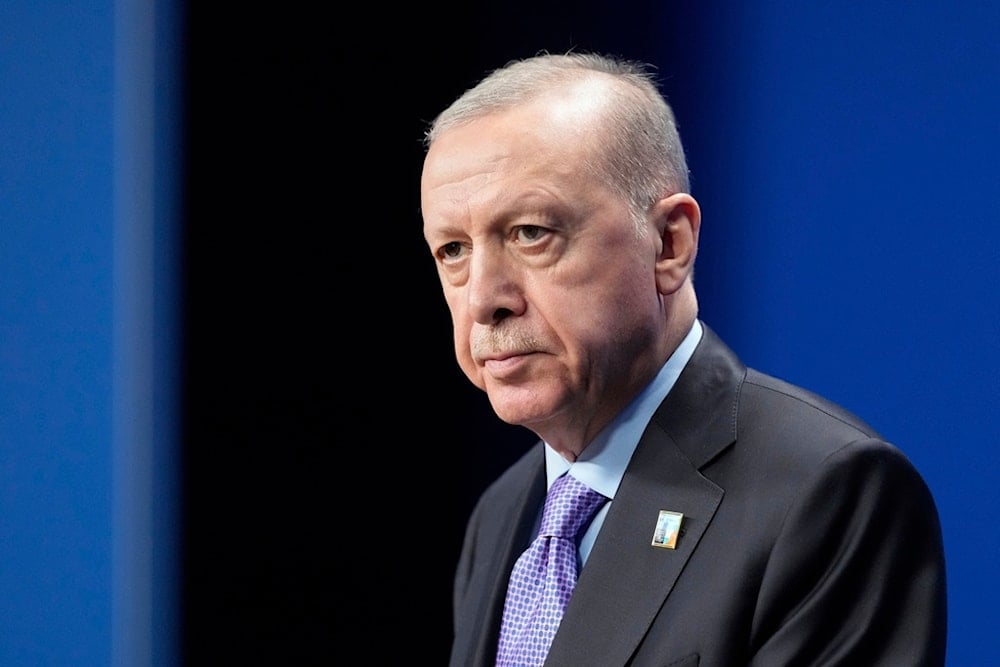Turkey plans container shelters for Gaza as winter approaches: Erdogan
Turkey claimed it is increasing aid efforts in Gaza amid worsening winter conditions, rising civilian casualties, and stalled humanitarian access due to the Israeli siege, while signaling readiness to engage all actors in Syria.
-

Turkish President Recep Tayyip Erdogan arrives for a press conference after the plenary session at the NATO summit in The Hague, Netherlands, Wednesday, June 25, 2025. (AP Photo/Markus Schreiber)
President Recep Tayyip Erdogan claimed on Monday that Turkey is intensifying efforts to send container shelters to the Gaza Strip as winter conditions worsen.
He noted that Ankara is in ongoing contact with intermediaries to facilitate the entry of the units into the enclave, where thousands of displaced Palestinians are still living in torn tents.
According to Erdogan, the cold and worsening weather are deepening an already severe humanitarian emergency, and Turkish authorities are working to navigate Israeli restrictions on aid deliveries amid the continued siege.
"Despite various difficulties from Israel in the area of humanitarian aid, we are using all available means to deliver aid to Gaza. Our 18th ship with 810 tonnes of humanitarian cargo arrived at the port of Arish on Friday. We have sent 47 trucks to the Rafah crossing point. As cold and rainy weather approaches, the situation in Gaza is worsening. The population should be evacuated from tattered tents as quickly as possible. Sending containers from our country to Gaza will significantly alleviate the situation. We continue to be in contact regarding this matter," he said following a cabinet meeting.
Gaza Crisis Intensifies
Erdogan’s remarks come as humanitarian concerns escalate sharply. Earlier in the day, Hamas urged Arab states and the international community to ramp up pressure on "Israel" to open all crossings, lift the blockade, and allow the entry of medical supplies, tents, and prefabricated shelters. The group said the humanitarian protocol of the ceasefire is being obstructed, contributing to severe shortages of food, medicine, clean water, and emergency shelter.
Hamas also pointed to the collapse of the healthcare system two years into the ongoing genocide in Gaza. Since the ceasefire took effect on October 10, the movement reports that 266 Palestinians have been killed and 635 wounded by Israeli fire. It cited World Health Organization data indicating that more than 900 patients have died due to delays in medical evacuation linked to the blockade, while some 16,500 people, including 4,000 children, are still awaiting approval to leave Gaza for urgent treatment.
The ceasefire was formally backed on October 13 by a joint declaration signed by US President Donald Trump, Egyptian President Abdel Fattah Sisi, Qatar’s Emir Tamim bin Hamad Al Thani, and Erdogan.
Turkey Signals Continued Engagement in Syria
Erdogan also commented on the shifting political landscape in Syria, pledging that Ankara would keep channels open with all key actors. "As I have stated repeatedly, Turkey considers all the peoples of Syria to be its brothers and strives to ensure peace, security, and prosperity for all. Based on this understanding, we will continue our dialogue with all regional stakeholders in the near future with the goal of establishing lasting peace and stability in Syria," he said.
Ankara’s outreach comes at a moment of major political upheaval in Syria. Since late 2024, the country has undergone dramatic changes, beginning with a large-scale offensive launched by armed opposition groups in November that culminated in their entry into Damascus on December 8. President Bashar al-Assad subsequently resigned and fled the country, paving the way for a transitional government headed by Ahmed al-Sharaa, a former Al-Qaeda commander who assumed the presidency on January 29.
The realignment in Damascus has opened new dynamics with Kurdish-led forces in the northeast. Throughout 2025, the Syrian Democratic Forces (SDF) engaged in negotiations with the new leadership over integrating their military structures into the Syrian armed forces. Although a political agreement was reached, the process has remained fragile, and sporadic clashes between SDF units and government forces continue in several regions. The uncertainty surrounding this integration is particularly significant for Turkey, which views SDF and YPG formations as an extension of the PKK and therefore a core national security threat.
Read more: Protests in Damascus and east towns against the SDF

 4 Min Read
4 Min Read










